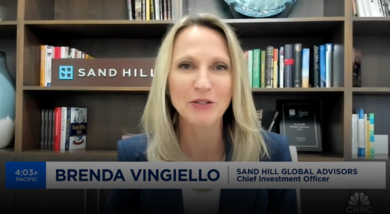Brenda Vingiello, Sand Hill's Chief Investment Officer, joined the Halftime Report to discuss the software space. This content was produced and provided by an unaffiliated

On Turbulence, Landings, and a Brighter Future
February 2, 2023
The beginning of every new year always brings opportunity for fresh perspectives, and usually expectations of improving upon the prior year. We are hopeful that this task won’t be too hard in the capital markets, as there was certainly a lot of turbulence last year with most assets delivering some of their worst returns in history. And yet, even though there was widespread speculation that the economy was either in recession last year or close to entering one, consumer spending—which accounts for about 70% of economic activity—remained resilient even as inflation reached multi-decade highs. This strength was driven by a strong job market and significant savings that had been amassed during the pandemic from a combination of government aid, reduced spending on services, significant savings from mortgage refinancings, and meaningful appreciation in the stock market. So, while many economic strategists’ recessionary forecasts for 2022 were flat out wrong and GDP growth actually accelerated as the year elapsed, we are now left to ponder what outcome we might face in this new year.
Despite gloomy predictions, we are off to a decent start to 2023 as we are finally starting to see clear signs that inflation peaked in June of last year, while the job market remains historically strong plus bond yields are higher than they have been in over a decade. However, with interest rates now at levels that are restricting economic activity, we continue to muddle through a period of ongoing economic uncertainty with many conflicting datapoints that have been with us for a while and will likely persist for some time to come. The sectors of the economy that benefitted so handsomely from the pandemic environment—like technology, goods, and manufacturing—are definitively slowing as trends continue to normalize. Signs of this are now commonplace with layoff announcements coming from many companies that over-hired during the pandemic years, retailers discounting unwanted merchandise, and economic data suggesting sluggish manufacturing. Meanwhile, the service economy keeps recovering following two very lean pandemic years, and it is now responsible for much of the strength in the job market. Even though this strange imbalance has allowed the economy to maintain overall growth for the last few years, it certainly creates a cloudy economic picture. Some have referred to this as a rolling recession and, in many ways, that is what has happened over the last few years as the economy has been distorted by the pandemic environment and is now normalizing. Notwithstanding the welcome improvement on inflation, the biggest question we still face is whether the Federal Reserve’s actions might ultimately cause an economic slowdown that touches all parts of our economy, or if a milder soft landing can be achieved.
Over the last year, the likelihood of achieving a soft landing has been the source of constant debate. A soft landing would be characterized by slowing economic growth that declines just enough to solve the current inflation problem but without causing recession. Wall Street and most media describe this as economic nirvana and something that is nearly impossible to achieve. Some caution is certainly warranted with such an expectation since the Federal Reserve has a poor track record of avoiding recessions during rate-hiking cycles. Yet, recent economic data suggests that the economy has remained healthy even as inflation has begun to meaningfully decelerate, which lends encouragement to the possibility that this outcome might be achievable. Still, if we find ourselves in an economic slowdown of any kind, particularly one where the economy appears to be flying at stall speed and would therefore be subject to turbulence, it will probably not feel very nirvana-like. In fact, we may not really know whether the economy has been in a mild recession or a soft landing until several months after the fact.
What we know today is that the job market is still incredibly healthy, and as of the most recent Job Openings and Labor Turnover Survey (JOLTS) report, available positions still stood at more than ten million as of December 2022. Contrary to popular belief, the composition of such openings spans many industries with the largest number of unfilled positions coming from professional and business services, education and health services, and leisure and hospitality. In our view, the key to avoiding a recession is maintaining relative strength in the job market. Outside of the labor market, consumer balance sheets are relatively healthy and many of the evils that plagued the 2008 financial crisis—like sub-prime loans and home equity lines of credit—are essentially non-existent this time around. Corporate balance sheets are also relatively healthy as many companies took advantage of the historically low interest rate environment in 2020 and 2021 and secured new debt at very favorable rates.
Of course, if interest rates climb to levels that further restrict growth and put additional pressure on both consumers and businesses, then we could see a more broad-based downturn develop. Historically, the American consumer has been very resilient, but they will pull back when actual job losses occur or when broad-based fear arises about unemployment. In such circumstances, with so much of our economy relying on our collective spending, a recession would be inevitable.
Positioning a portfolio at this point for any one of these economic outcomes is challenging. Yet, market conditions have changed materially over the last year. Since the end of the year, investment grade bonds are yielding 5-7% and many parts of the equity market are now trading at very favorable valuation levels. This is a sharp change from the beginning of last year when yields were near historic lows and most stock valuations were extended. Even though much uncertainty still exists, we can collectively agree that after talking about a potential recession for the last 12 months, if one does materialize, it will be the most anticipated in history. By the end of this year, there will likely be new topics of conversation, and whether good or bad, the financial markets will digest it and move forward. As always, we plan to take advantage of any investment opportunities we identify along the way.
We wish you and your family a happy and healthy 2023!
Articles and Commentary
Information provided in written articles are for informational purposes only and should not be considered investment advice. There is a risk of loss from investments in securities, including the risk of loss of principal. The information contained herein reflects Sand Hill Global Advisors' (“SHGA”) views as of the date of publication. Such views are subject to change at any time without notice due to changes in market or economic conditions and may not necessarily come to pass. SHGA does not provide tax or legal advice. To the extent that any material herein concerns tax or legal matters, such information is not intended to be solely relied upon nor used for the purpose of making tax and/or legal decisions without first seeking independent advice from a tax and/or legal professional. SHGA has obtained the information provided herein from various third party sources believed to be reliable but such information is not guaranteed. Certain links in this site connect to other websites maintained by third parties over whom SHGA has no control. SHGA makes no representations as to the accuracy or any other aspect of information contained in other Web Sites. Any forward looking statements or forecasts are based on assumptions and actual results are expected to vary from any such statements or forecasts. No reliance should be placed on any such statements or forecasts when making any investment decision. SHGA is not responsible for the consequences of any decisions or actions taken as a result of information provided in this presentation and does not warrant or guarantee the accuracy or completeness of this information. No part of this material may be (i) copied, photocopied, or duplicated in any form, by any means, or (ii) redistributed without the prior written consent of SHGA.
Video Presentations
All video presentations discuss certain investment products and/or securities and are being provided for informational purposes only, and should not be considered, and is not, investment, financial planning, tax or legal advice; nor is it a recommendation to buy or sell any securities. Investing in securities involves varying degrees of risk, and there can be no assurance that any specific investment will be profitable or suitable for a particular client’s financial situation or risk tolerance. Past performance is not a guarantee of future returns. Individual performance results will vary. The opinions expressed in the video reflect Sand Hill Global Advisor’s (“SHGA”) or Brenda Vingiello’s (as applicable) views as of the date of the video. Such views are subject to change at any point without notice. Any comments, opinions, or recommendations made by any host or other guest not affiliated with SHGA in this video do not necessarily reflect the views of SHGA, and non-SHGA persons appearing in this video do not fall under the supervisory purview of SHGA. You should not treat any opinion expressed by SHGA or Ms. Vingiello as a specific inducement to make a particular investment or follow a particular strategy, but only as an expression of general opinion. Nothing presented herein is or is intended to constitute investment advice, and no investment decision should be made based solely on any information provided on this video. There is a risk of loss from an investment in securities, including the risk of loss of principal. Neither SHGA nor Ms. Vingiello guarantees any specific outcome or profit. Any forward-looking statements or forecasts contained in the video are based on assumptions and actual results may vary from any such statements or forecasts. SHGA or one of its employees may have a position in the securities discussed and may purchase or sell such securities from time to time. Some of the information in this video has been obtained from third party sources. While SHGA believes such third-party information is reliable, SHGA does not guarantee its accuracy, timeliness or completeness. SHGA encourages you to consult with a professional financial advisor prior to making any investment decision.







